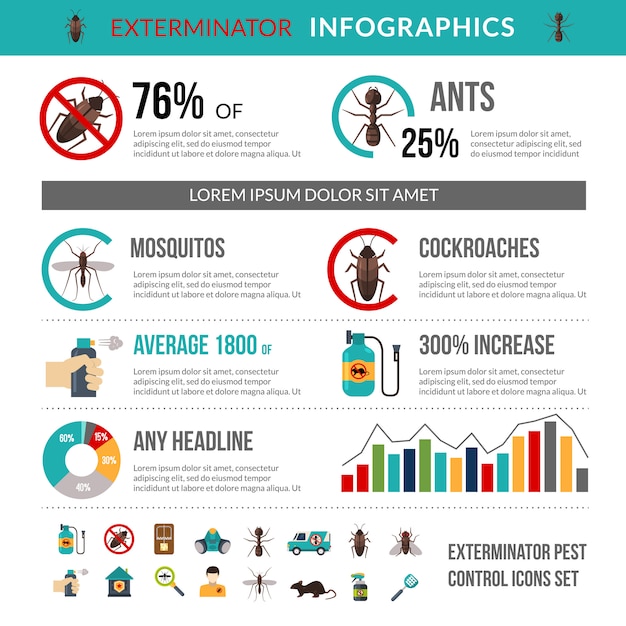The Tricks Of Bug Control Pros! Release The Power Of Sophisticated Techniques And Say Goodbye To Pesky Bugs Forever
The Tricks Of Bug Control Pros! Release The Power Of Sophisticated Techniques And Say Goodbye To Pesky Bugs Forever
Blog Article
Authored By-Vazquez Gaarde
Are you tired of counting entirely on sprays to manage parasites in your home or work environment? While sprays can be effective, pest control professionals have actually created advanced strategies that go beyond simply splashing chemicals.
These methods not only offer much more effective and long-lasting options, but also focus on decreasing using damaging chemicals. By exploring these sophisticated methods, you will certainly find an entire new world of pest control methods that are not just reliable, yet also eco-friendly.
So, are you prepared to take your insect control game to the next level?
Integrated Parasite Monitoring (IPM)
If you're trying to find a reliable and environmentally-friendly method to pest control, Integrated Parasite Management (IPM) is the service you need. IPM focuses on long-term prevention and administration of insects, instead of just depending on pesticides. This technique takes into consideration the certain demands and behaviors of pests, as well as the surrounding atmosphere.
By using a mix of strategies such as biological control, habitat adjustment, and targeted chemical use, IPM aims to minimize the reliance on chemical therapies and minimize harm to non-target organisms.
One vital aspect of IPM is monitoring and recognizing bugs properly. This involves consistently inspecting and examining the pest populace, along with determining the details species existing. By comprehending the biology and behavior of bugs, bug control experts can establish targeted approaches to disrupt their life cycle and decrease their numbers.
An additional vital element of IPM is using non-chemical control methods whenever feasible. This can consist of physical barriers, such as mounting displays or sealing cracks and openings, to avoid bugs from getting in buildings. In addition, social techniques, like proper hygiene and waste administration, can help remove parasite food sources and reproducing premises.
When pesticides are essential, IPM concentrates on utilizing them judiciously and as a last resort. This implies selecting the least harmful and most effective option, applying it specifically and just to impacted areas, and adhering to all safety and security standards. By reducing pesticide usage, IPM lowers the prospective threats to human health and the atmosphere.
Biological Control
To even more enhance the effectiveness of Integrated Bug Monitoring (IPM), the following subtopic we'll discover is the technique of biological control. This strategy utilizes natural predators or parasites to control insects.
Right here are four essential facets of biological control:.
1. Introduction of natural adversaries: In this technique, advantageous pests or organisms are introduced to the location infested with parasites. https://docs.google.com/spreadsheets/d/11M6uqTa5GD7C0me1M7UYYv240lSuvgaiGvl6PEtCF5I/edit#gid=1865900013 -natural enemies victimize the insects, helping to lower their populace.
2. Preservation of natural adversaries: Rather than introducing new microorganisms, this technique focuses on producing a suitable environment for existing useful insects. This can be attained with offering food, sanctuary, and water sources.
3. Augmentation: Right here, the number of all-natural adversaries is boosted artificially by breeding and releasing them into the plagued area. This helps to quickly lower the pest populace.
4. Push-pull strategy: This strategy integrates repellents and attractants to adjust the behavior of bugs. Repellents push insects far from crops, while attractants lure them towards trap crops or locations where they can be conveniently regulated.
Habitat Alteration
Environment alteration plays an important function in pest control by altering the environment to prevent parasite invasions. By making changes to the physical qualities of a room, you can develop an unwelcoming setting for bugs, making it harder for them to make it through and flourish.
One common approach of environment alteration is getting rid of or decreasing prospective food resources for pests. This can include correct waste monitoring, sealing containers, and tidying up food crumbs.
Additionally, getting rid of or decreasing areas of standing water can assist regulate pests like insects.
Changing mosquito treatment by cutting trees and bushes away from structures can additionally stop insects from accessing your residential or commercial property.
Verdict.
So there you have it - the sophisticated strategies used by pest control professionals surpass simply spraying chemicals. Integrated Insect Monitoring (IPM) incorporates numerous methods to efficiently control parasites, while biological control uses natural enemies to maintain pest populations in check.
Environment modification likewise plays an important function in protecting against bug infestations.
Did you understand that according to a research, implementing IPM strategies minimized pesticide usage by approximately 71%? This not just secures our wellness and the environment but also saves cash in the future.
